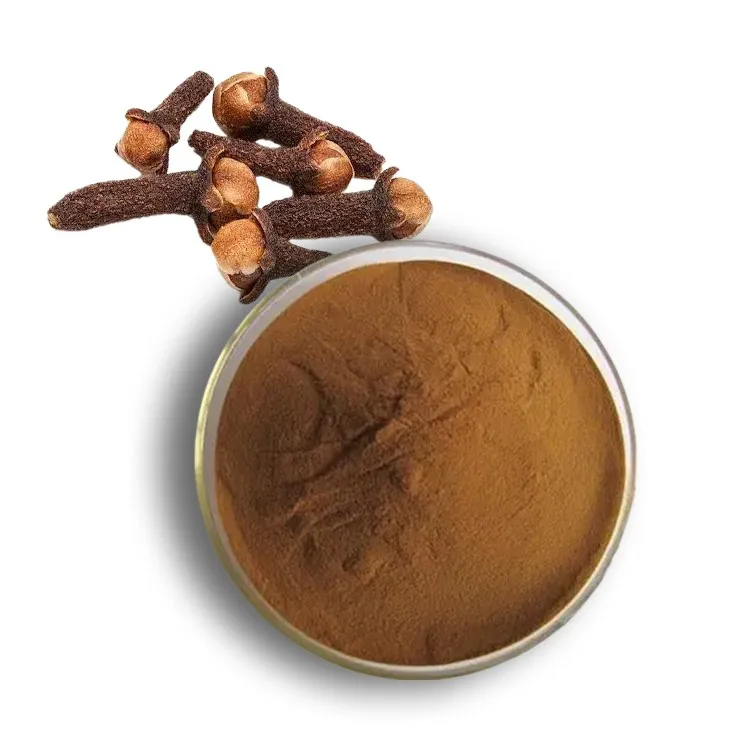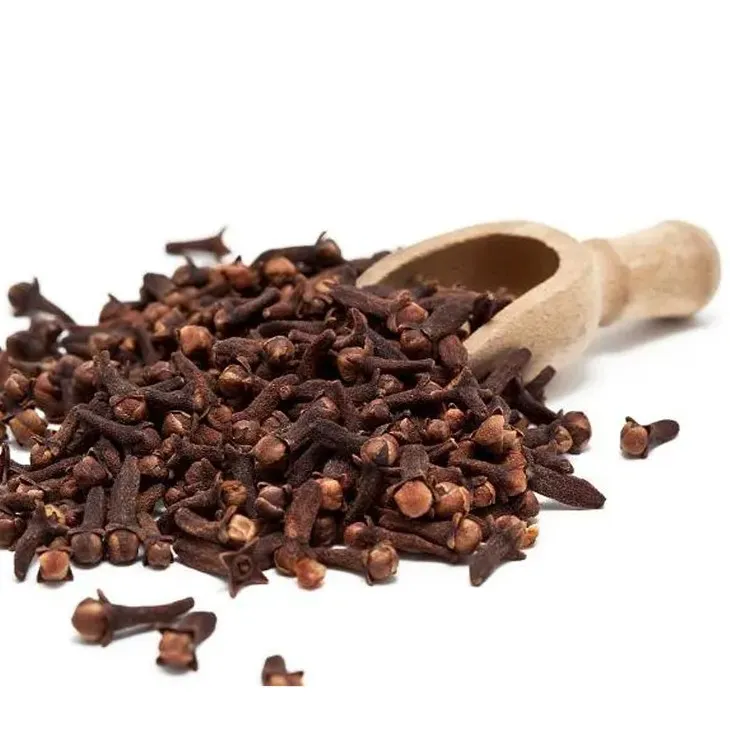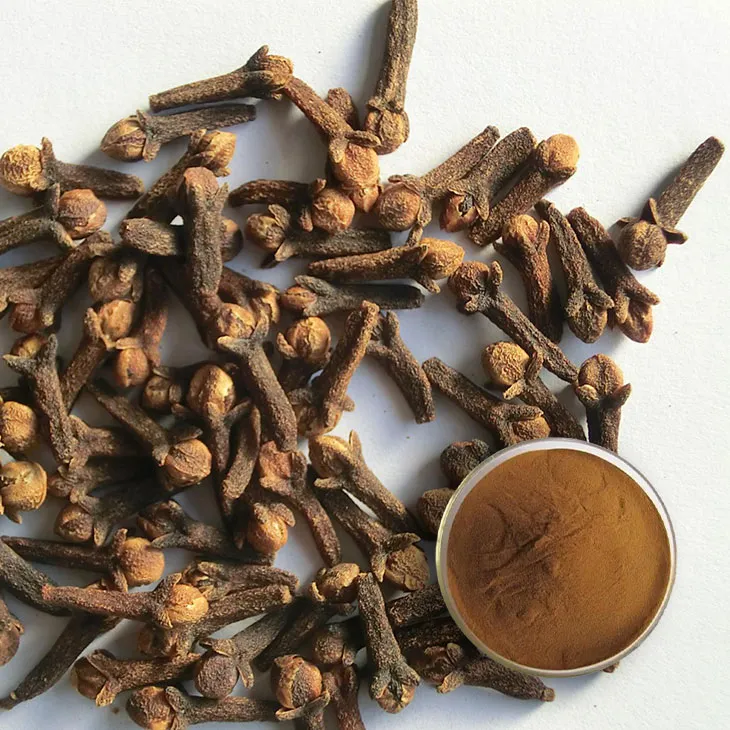- 0086-571-85302990
- sales@greenskybio.com
Chinese Clove Powder Manufacturers.
2024-11-27

1. Introduction to Chinese Clove Powder Manufacturing
China's Clove Powder manufacturers form a diverse and vibrant sector within the country's food and spice industry. Clove Powder, derived from the dried flower buds of the clove tree, has a long history of use in Chinese cuisine, traditional medicine, and even in the cosmetic and fragrance industries. The manufacturing process in China is a complex yet well - established one, taking advantage of the nation's natural resources and technological capabilities.

2. Geographical and Climatic Advantages
China's favorable geographical location and climate play a significant role in the production of clove powder. Geographical Diversity: With a vast territory, China has regions that are suitable for the growth of cloves. Some areas in southern China, with their warm and humid climates, provide an ideal environment for clove trees to thrive. This natural advantage ensures a stable supply of raw materials for clove powder manufacturers. Climate Conditions: The right amount of sunlight, rainfall, and temperature variations in these regions contribute to the healthy growth of clove buds. These buds, when harvested at the right time, are of high quality, which in turn results in excellent - quality clove powder.

3. Specialties of Chinese Manufacturers
3.1 Organic Clove Powder Production
Some Chinese manufacturers have made a name for themselves in the production of organic clove powder. As the global demand for natural and organic products continues to rise, these manufacturers have adapted their production processes to meet international standards. Certification and Standards: They obtain relevant organic certifications, such as USDA Organic (for export to the United States) or EU Organic, which require strict compliance with regulations regarding the use of pesticides, fertilizers, and processing methods. Sourcing of Organic Cloves: These manufacturers ensure that the cloves used in their powder production are sourced from organic - certified farms. This involves working closely with farmers who follow organic farming practices, such as using natural fertilizers like compost and biological pest control methods.
3.2 Customization Capabilities
Other manufacturers are renowned for their ability to customize clove powder products. Particle Size Customization: Customers may have specific requirements regarding the particle size of the clove powder. For example, in the food industry, a finer powder may be preferred for baking, while a coarser powder might be more suitable for making spice blends. Chinese manufacturers can adjust their grinding and milling processes to produce the desired particle size. Packaging Options: They also offer a wide range of packaging options. From small sachets for individual use to large bulk containers for industrial customers, manufacturers can meet the diverse packaging needs of their clients. This includes options such as vacuum - sealed packaging to preserve the freshness of the clove powder, or recyclable packaging materials for environmentally - conscious customers.

4. The Impact of E - commerce on Chinese Clove Powder Manufacturers
E - commerce Expansion: The growth of e - commerce has had a profound impact on Chinese clove powder manufacturers. It has opened up new sales channels, allowing them to reach a wider global customer base. Online platforms such as Alibaba, Amazon, and other specialized food and spice e - commerce sites have become important avenues for manufacturers to showcase and sell their products. Global Reach: Through e - commerce, Chinese - made clove powder can now be easily accessed by consumers all over the world. This has not only increased the sales volume but also promoted the popularity of Chinese - made clove powder on a global scale. Marketing and Brand Building: Manufacturers can use e - commerce platforms to implement effective marketing strategies. They can create engaging product descriptions, use high - quality images, and even offer customer reviews and testimonials to build their brand reputation. This helps in differentiating their products from competitors in the international market.
5. Quality Control and Assurance in Clove Powder Manufacturing
Raw Material Inspection: Quality control in Chinese clove powder manufacturing starts with the inspection of raw materials. Manufacturers carefully examine the cloves they receive to ensure that they are of the appropriate quality. This includes checking for factors such as the size, color, and aroma of the cloves, as these can affect the final quality of the powder. Processing Standards: During the manufacturing process, strict processing standards are adhered to. This involves proper drying, grinding, and packaging techniques. For example, the drying process must be carried out at the correct temperature and humidity levels to prevent spoilage or loss of flavor. Final Product Testing: Before the clove powder is shipped to customers, it undergoes final product testing. This includes tests for purity, microbial content, and flavor profile. Only products that meet the established quality standards are released for sale.
6. Research and Development in Clove Powder Production
New Product Development: Chinese manufacturers are increasingly investing in research and development to create new clove powder - based products. This could include innovative blends of clove powder with other spices for unique flavor profiles, or the development of clove powder - infused products for the cosmetic or health - care industries. Improving Production Efficiency: R & D efforts are also focused on improving production efficiency. This may involve the adoption of new grinding technologies to reduce production time and energy consumption, or the development of more efficient drying methods to preserve the quality of the cloves. Meeting Market Trends: By staying at the forefront of research and development, manufacturers can better meet the changing market trends. For example, as consumers become more health - conscious, manufacturers can develop low - sodium or sugar - free clove powder products to cater to this demand.
7. Competition and Collaboration Among Chinese Clove Powder Manufacturers
Competition: The clove powder manufacturing industry in China is highly competitive. Manufacturers compete on various fronts, including price, quality, and product innovation. To gain a competitive edge, some manufacturers may offer lower prices by optimizing their production processes, while others may focus on differentiating their products through unique packaging or high - quality organic production. Collaboration: However, there is also room for collaboration among manufacturers. For example, they can collaborate on research and development projects to share costs and expertise. Small - scale manufacturers may team up with larger ones to access better distribution channels or to jointly promote the use of clove powder in international markets. This collaborative approach can benefit the entire industry and help it to grow and thrive.
8. Future Outlook for Chinese Clove Powder Manufacturers
Market Expansion: The future looks promising for Chinese clove powder manufacturers. With the increasing popularity of international cuisines and the growing awareness of the health benefits of cloves, the demand for clove powder is expected to continue to rise. Manufacturers are likely to expand their market share both domestically and internationally. Sustainable Production: There will also be a greater emphasis on sustainable production methods. This includes sustainable farming practices for clove cultivation, as well as environmentally - friendly manufacturing processes. Manufacturers who can demonstrate their commitment to sustainability will be more likely to attract environmentally - conscious consumers. Technological Advancements: Continued technological advancements will play a crucial role in the industry's future. From advanced extraction methods to more efficient packaging technologies, these advancements will help manufacturers to improve product quality, reduce costs, and enhance their competitiveness in the global market.
FAQ:
Q1: What are the advantages of Chinese clove powder manufacturers?
Chinese clove powder manufacturers have several advantages. Firstly, China's favorable geographical location and climate in some regions are conducive to clove growth, ensuring a stable raw material supply. Secondly, they have diverse specialties. Some are good at organic production to meet the international demand for natural products, and others can customize products according to specific customer requirements like different particle sizes and packaging. Also, with the growth of e - commerce, they are expanding their online sales channels to reach a wider global customer base.
Q2: How do Chinese clove powder manufacturers meet the international market demand?
Chinese clove powder manufacturers meet international market demand in multiple ways. For the increasing demand for natural and organic products in the international market, some manufacturers focus on organic clove powder production. They also customize products according to customers' specific requirements. Moreover, by expanding their e - commerce sales channels, they can reach more international customers and better adapt to the international market.
Q3: Are there any specializations among Chinese clove powder manufacturers?
Yes, there are. Some Chinese clove powder manufacturers are experts in organic clove powder production. This caters to the growing preference for natural and organic products in the international market. Other manufacturers are noted for their ability to customize clove powder products, such as providing different particle sizes or various packaging options according to the specific needs of customers.
Q4: How are Chinese clove powder manufacturers promoting their products globally?
With the development of e - commerce, Chinese clove powder manufacturers are expanding their online sales channels. This allows them to reach a wider global customer base. By offering high - quality products with different specialties like organic production and customization, they are promoting the popularity of Chinese - made clove powder worldwide.
Q5: What role does the geographical location play for Chinese clove powder manufacturers?
The geographical location in China plays an important role for clove powder manufacturers. Some regions in China have a favorable climate for clove growth due to their geographical location. This provides a natural advantage for manufacturers as it ensures a certain amount of local clove supply, which is beneficial for the production of clove powder.
Related literature
- The Production and Market of Clove - related Products in China"
- "Chinese Spice Manufacturers: Focus on Clove Powder"
- "Organic Clove Powder Production in China: A Comprehensive Review"
- ▶ Hesperidin
- ▶ citrus bioflavonoids
- ▶ plant extract
- ▶ lycopene
- ▶ Diosmin
- ▶ Grape seed extract
- ▶ Sea buckthorn Juice Powder
- ▶ Beetroot powder
- ▶ Hops Extract
- ▶ Artichoke Extract
- ▶ Reishi mushroom extract
- ▶ Astaxanthin
- ▶ Green Tea Extract
- ▶ Curcumin Extract
- ▶ Horse Chestnut Extract
- ▶ Other Problems
- ▶ Boswellia Serrata Extract
- ▶ Resveratrol Extract
- ▶ Marigold Extract
- ▶ Grape Leaf Extract
- ▶ blog3
- ▶ blog4
-
Standard - process Mulberry Leaf Extract.
2024-11-27
-
100% Pure Natural White Willow Bark Extract.
2024-11-27
-
The Best Method for Extracting Vitamin D3.
2024-11-27
-
Chinese Lycopene Powder Factories.
2024-11-27
-
Chinese konjac powder factory.
2024-11-27
-
The Most Worth - Buying Lily Extract Brands.
2024-11-27
-
The best pitaya powder on the market.
2024-11-27
-
Aguaje Extract
2024-11-27
-
melatonin extract
2024-11-27
-
Mango flavored powder
2024-11-27
-
Echinacea Extract
2024-11-27
-
Kelp Extract Powder
2024-11-27
-
Hedyotis Diffusa Extract
2024-11-27
-
Reishi mushroom extract
2024-11-27
-
Garcinia Cambogia Extract
2024-11-27
-
White Peony Extract
2024-11-27
-
Aminolevulinic acid
2024-11-27





















